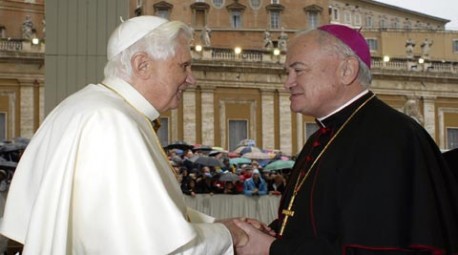July 22 2011 | ![]() 0 COMMENTS
0 COMMENTS ![]() print
print

Priests call for Confession protection
Publication Date: 2011-07-22
— Irish Government wants clergy to break seal of the Sacrament after the Cloyne Report
Catholic priests in Ireland have said the sanctity of confession must be protected in the face of the Irish government indicating that the confessional would not be exempt from rules on mandatory reporting of child abuse.
“The point is, if there is a law in the land, it has to be followed by everybody, there are no exceptions, there are no exemptions,” Frances Fitzgerald, Irish Children’s Minister, said after the publication of the Cloyne Report last week which showed allegations of abuse were being mishandled and withheld from the police as recently as 2008.
The Irish government has said it will introduce legislation that makes it mandatory for priests to reveal details of child abuse, even if they become known in the confessional. The offence would be punishable with up to five years in prison.
Condemnation
Bishop John McAreavey of Dromore said that the Irish bishops would await the publication of the legislation before assessing it. However, he said, he felt it was ‘unreal to suggest that the seal of confession has prevented the reporting of the abuse of children.’
Fr PJ Madden, spokesman for the Association of Catholic Priests, insisted that the sacramental seal of Confession is ‘above and beyond all else’ and should not be broken even if a penitent confesses to a crime.
He said he would strongly urge and appeal to the penitent, whether a priest or anyone else, to confess a crime to the police and have the civil aspect dealt with, but that he did not approve of the idea of reporting what was said. “If I’m breaking the law then somebody has to find a way to address that for me … but in my own right as a priest what I understand is the seal of confession is above and beyond all else,” he said. “The seal of confession is a very sacred seal for lots of different reasons way beyond this one single issue, however serious this one single issue is.”
However, Irish Prime Minister Enda Kenny has said that Canon law would not be allowed to supersede state law.
Cloyne Report
The judicial report into the handling of allegations of child sexual abuse against clerics in the Diocese of Cloyne was published last week and concluded that the Church’s own guidelines were ‘not fully or consistently implemented’ in the diocese as recently as 2008. The report, released by Judge Yvonne Murphy, also said Cloyne Bishop John Magee admitted to what has been described as inappropriate behaviour with a young man. It said the bishop embraced him, kissed him and told the young aspirant for the priesthood that he loved him.
The 400-page report also records for the first time stark disagreement among Irish bishops over whether Bishop Magee, a former secretary to three popes, should quit as bishop of Cloyne after December 2008, when the National Board for Safeguarding Children in the Catholic Church said he was using child safeguarding policies that were ‘inadequate and, in some respects, dangerous.’ The commission was charged with investigating the handling of allegations made against 19 priests from 1996—when the Church in Ireland first implemented child protection procedures—to 2009.
The commission found that ‘the primary responsibility for the failure to implement the agreed procedures lies with Bishop Magee.’
“It is a remarkable fact that Bishop Magee took little or no active interest in the management of clerical child sexual abuse cases until 2008,” the report notes.
Bishop Magee
Since the report was published, Bishop Magee, who resigned in 2010, has faced calls to return to Ireland to answer the charges in the Cloyne Report.
The Archbishop of Dublin said he should return and assume accountability. Archbishop Diarmuid Martin said that it would be ‘good’ if Bishop Magee, who is believed to be in America, came back to Ireland.
“I do not foresee a situation where he would practice public ministry ever again,” Archbishop Martin said when asked if Bishop Magee should face criminal investigations in Ireland and a church trial in Rome. “Those in church and State who have acted wrongly or inadequately should assume accountability.”
Weakest link
While insisting that the majority of the Irish bishops and heads of religious orders were committed to implementing proper child safeguards, Archbishop Martin warned ‘the system is only as good as its weakest link.’
Referring to reports into three other dioceses to be completed by the end of July by the Church’s own watchdog, Archbishop Martin added: “I do not see the point of having such reports if they are not published.”
Archbishop Martin also said he believed that a letter from a cardinal telling the Irish bishops to send complaints to Rome rather than to civil authorities was ‘not helpful.’










